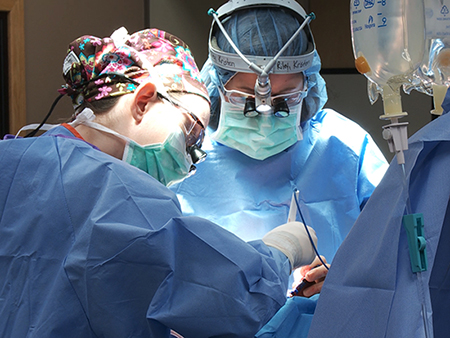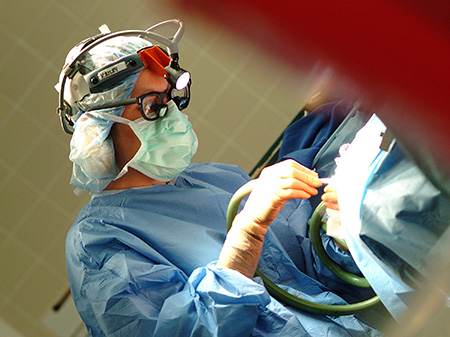Editor’s note: Since the original publication of this article in Oct. 2020, one female member of the faculty has taken a position outside of UAB.
 Physicians say it is crucial for trainees to have role models and mentors who have shared experiences.The University of Alabama at Birmingham employs more female neurosurgery faculty than the national average, reaffirming efforts to increase diversity within the university and the UAB Health System. Women represent only 12 percent of neurosurgeons in the United States and Canada, according to the National Institutes of Health. At the UAB Department of Neurosurgery in the School of Medicine, women make up 25 percent of the overall faculty and 21 percent of the clinical neurosurgeons.
Physicians say it is crucial for trainees to have role models and mentors who have shared experiences.The University of Alabama at Birmingham employs more female neurosurgery faculty than the national average, reaffirming efforts to increase diversity within the university and the UAB Health System. Women represent only 12 percent of neurosurgeons in the United States and Canada, according to the National Institutes of Health. At the UAB Department of Neurosurgery in the School of Medicine, women make up 25 percent of the overall faculty and 21 percent of the clinical neurosurgeons.
“Surgery in general, and neurosurgery in particular, have long been male-dominated specialties,” said James Markert, M.D., Ph.D., professor and chair of the department. “Commitment to diversity is a cornerstone of UAB, and we feel that our entire department, from faculty to trainees, as well as our patients, are well served by a diverse workforce.”
According to a study published in 2019 in the journal Cureus, less than 10 percent of medical school graduates in the 1960s were women. Now, almost half of all medical school graduates are women.
UAB’s neurosurgery department has 27 faculty members. Seven are women: two full professors, three assistant professors, one adjunct professor and one instructor. In addition, 16 percent of the current residents in neurosurgery are female.
The 2019 study in Cureus reported that less than 6 percent of full professors in neurosurgery were women. At UAB, that number is 20 percent, as two of UAB’s 10 full clinical professors, Melissa Chambers, DVM, M.D., and Kristen Riley, M.D., are women.
“I attended medical school and did my residency at a major university on the East Coast,” said Elizabeth Liptrap, M.D., an assistant professor who joined the UAB faculty last November. “There were no women on the faculty there, and I was only the third female resident in the past 30 years or so. The culture as well as the lack of female residents and faculty was considered normal for neurosurgery.”
Liptrap says having a more equitable environment is healthy and beneficial for patients, medical students, residents and faculty.
“It’s especially important in educating the next generation of physicians,” she said. “I often have female students reach out to me for guidance and help. I think it’s important to have mentors who have had similar experiences, and can offer advice and perspectives based on that common ground. For a career in medicine, it is crucial to have role models and mentors, so I try to be very supportive of women who are interested in medicine and surgery.”
Nicole Bentley, M.D., an assistant professor who joined UAB’s faculty in September 2018, agrees.
 21 percent of UAB's neurosurgeons are women, far exceeding the national average of 12 percent.“Mentoring female residents and students is vitally important,” Bentley said. “I was fortunate to do residency in a department with the first female chair of neurosurgery in the country. It is so valuable to have someone to go to for questions, advice and perspective.”
21 percent of UAB's neurosurgeons are women, far exceeding the national average of 12 percent.“Mentoring female residents and students is vitally important,” Bentley said. “I was fortunate to do residency in a department with the first female chair of neurosurgery in the country. It is so valuable to have someone to go to for questions, advice and perspective.”
The increase in female physicians over the past few decades has also fueled an increase in research into women’s health, and an increase in the number of women recruited to participate in research studies.
“Research must be representative of the entire community,” Bentley said. “You cannot study a disease, medication or therapy in just one segment of society. In order to be effective, research must be conducted in everyone affected: men and women, minorities, those with differing socioeconomic status or cultural perspectives.”
Bentley came to UAB in part to conduct research on new surgical therapies for movement disorders such as Parkinson’s disease, including deep brain stimulation with Bart Guthrie, M.D., and to perform epilepsy surgery, including laser interstitial thermal therapy, or LITT, with Kristen Riley, M.D.
Liptrap’s clinical and research focus is cerebrovascular disease.
“There are conditions that affect women more than they do men, and conditions that affect the genders in different ways,” she said. “Having more women in medicine can help to address women’s health issues in a more direct fashion.”
Female faculty in the Department of Neurosurgery at UAB are clinical neurosurgeons Melissa Chambers, DVM, M.D., professor; Kristen Riley, M.D., professor; Nicole Bentley, M.D., assistant professor; and Elizabeth Liptrap, M.D., assistant professor. Research faculty are Jianmei Wu Leavenworth, M.D., Ph.D., assistant professor; Bonita Agee, Ph.D., instructor; and Beverly Walters, M.D., adjunct professor.